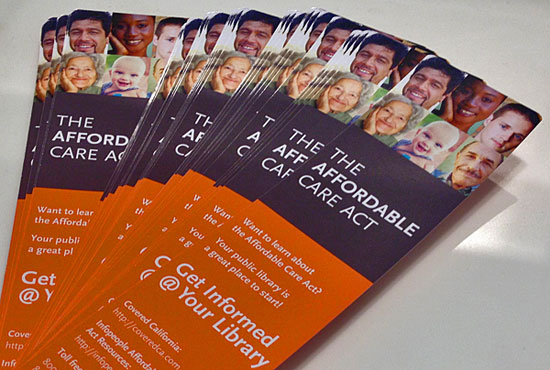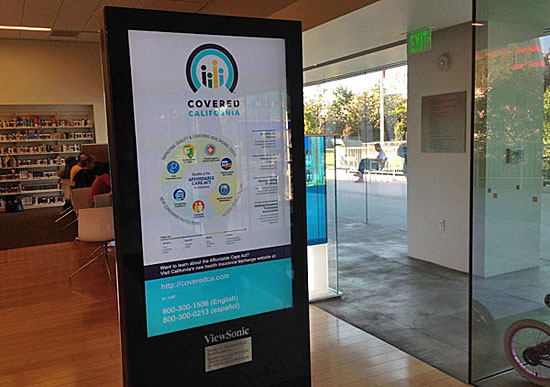Checking out Obamacare at the library
November 14, 2013

Affordable Care Act bookmarks are available at the info desk at the county's West Hollywood Library.
They don’t wear white coats or wield stethoscopes, but librarians have emerged as preferred providers, of sorts, in Los Angeles County’s massive mobilization to help thousands sign up for health insurance under the Affordable Care Act.
“They reach so many people, and they’re such a trusted source of information,” said Amy Luftig Viste, director of community partner programs for the county’s Department of Health Services. The department has turned to city and county librarians as key partners in a wide-ranging outreach effort that includes handing out brochures and specially printed informational bookmarks, answering basic questions and, at times, reaching out proactively to make sure patrons are aware of the new law and how it could affect them.
Librarians aren’t the only ones out there on the front lines. As the county seeks to draw the attention of hundreds of thousands of uninsured residents newly eligible for coverage under the Affordable Care Act, it has drafted a sometimes unexpected crew of surrogate messengers—ranging from the county Arts Commission to the L.A. City Taxicab Commission—to help get the word out.
The goal: making sure that everybody—even those who might not fit a stereotypical image of the uninsured—knows about their potential benefits under the law.
The health department has “proactively reached out to new populations including taxi drivers, artists, students and recently released jail inmates,” according to a recent report to the Board of Supervisors that also detailed efforts to train city and county librarians on the law.
“One of the challenges we always face is that there is a perception of what the uninsured look like, where the uninsured may live, all of those types of things,” said Tangerine Bingham, deputy director of managed care for the health department. “But we know that uninsured status is across the economic spectrum, and race, ethnicity, occupation.”
Breaking through to various groups and professional subcultures has meant getting creative in thinking about who might qualify for either the state’s new insurance exchange, Covered California, or for Medi-Cal, which is expanding under the new law to extend eligibility to 1.4 million additional Californians. So—beyond partnering with other county departments, such as the Department of Public Social Services—the health department has sought out associations with ties to specific populations, in effect leveraging the organizations’ credibility with their members.
Brochures are now posted at taxi operators’ dispatch centers throughout Los Angeles, and information has gone out to drivers via the mobile display terminals in their cabs. Artists, meanwhile, are being invited to the county Arts Commission on Dec. 5 for an explanatory seminar on “how to get affordable health insurance with the help of tax credits and federal subsidies.”
At libraries, the outreach is broader, building on a growing trend of libraries serving as community centers and repositories of information far beyond the encyclopedias in the reference section.
There are practical reasons for libraries, and librarians, to play a role now.
“We have public computers and we have free WiFi,” said County Librarian Margaret Donnellan Todd, who said librarians knew from the outset that they would be hit with public requests for information as soon as the law rolled out. “We have the ability to kind of navigate [patrons with health care questions] to where they need to be.”
Beyond that, Todd said, librarians enjoy broad public respect as honest and impartial brokers of information. “We don’t have any other motive,” she said.
That’s important, given the controversies surrounding the launch of the system nationally—including persistent glitches on the U.S. website, www.healthcare.gov. California’s exchange, Covered California, has largely escaped the criticism leveled at the national site, although concerns about cancelled policies have been raised here as well as elsewhere in the country. According to numbers released this week, California is leading the country in new enrollments under the law, representing one-third of all Americans who have signed up so far.
“Librarians are getting a lot of questions about the federal website,” Todd said. “But from what I understand, California’s website is in a lot better shape.”
Controversies notwithstanding, questions that library staffers have fielded from the public so far have tended to be fairly basic: “Should I do this? What’s it all about?” said Susan Broman, the county library system’s head of adult and digital services.
Sometimes, Todd said, librarians see the opportunity of reaching out proactively to patrons—like parents and caregivers in the Family Place early literacy program—to make sure they’re getting the information they need about health care reform.
It’s a win-win—for society and for library users of the future.
“Obviously, it’s a very good thing when families have insurance,” Todd said. “One of the things that helps a child get ready to read is a healthy body.”
Posted 11/15/13













 405 bridge work causes a stink
405 bridge work causes a stink
